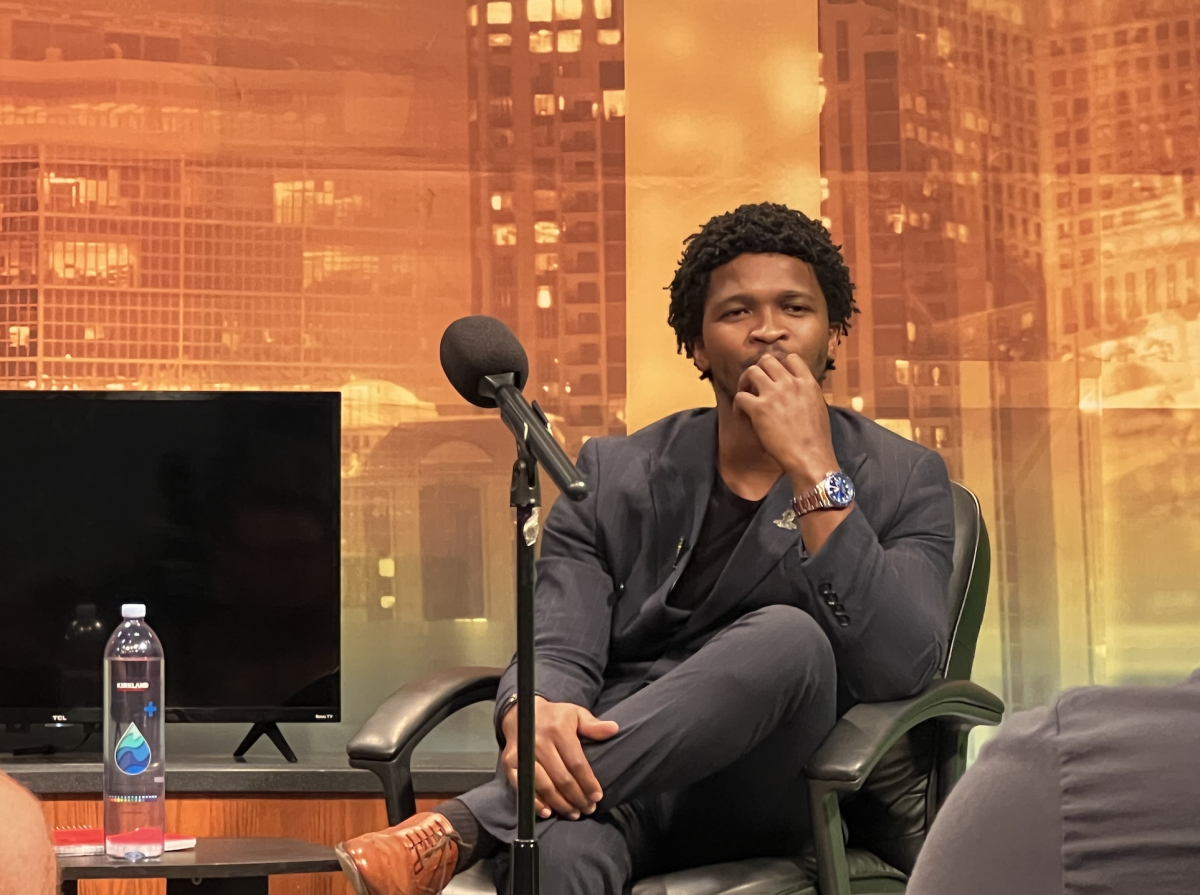What is our collective responsibility in the light of our current and contemporary experiences?
That is the question that Siyabulela Mandela, a descendant of Nelson Mandela, posed to students attending his discussion at the Fresno State Speech Arts building Room 172.
Siyabulela is in Fresno for the unveiling of the Nelson Mandela statue that will happen today, along with a discussion with ASI President Faith Van Hoven that will take place Friday.
Siyabulela shared how he will be seen on Friday.
“You’ll see me in my Arafat, which is a Palestinian scarf that represents the struggle of the people of Palestine,” Siyabulela said.
The discussion began with Siyabulela sharing a bit of his background and what Nelson Mandela stood for along with other activists across the world.
“I am free, not because of Mandela, but because of each and every individual who was there in that generation, who marched the streets either here in Fresno, in Dallas, in Georgia in Alabama, calling for the free Mandela movement,” Siyabulela said.
Siyabulela then reflected on how past generations have taken on the collective responsibility to tackle a specific social issue, naming Martin Luther King, Rosa Parks, John Lewis and Gandhi as examples, and asked students what will be the purpose of this generation in the light of current experiences.
Students asked difficult questions regarding journalism and what would be the most ethical way to cover conflict.
Siyabulela then shared his experience as a past journalist. He said that he worked with the Media Development Organization, within the Janam TV channel, but left the organization after nearly five years because at the time a new war arose they were not allowed to speak or write about it.
He talked to students about how African media is polarized in the West. As Siyabulela put it, everyone in South Africa knows who the president of the United States is but not a lot of people in the U.S. know who the president of South Africa is.
Since leaving his journalism job he has worked in the International Development Sector focusing on human rights, media freedom, democracy and post-conflict reconstruction and development.
Veena Howard, professor of philosophy at Fresno State, was tasked with bringing in a speaker for the unveiling of the statue. After connecting with Nelson Mandela’s daughter and her not being able to come she decided to look for someone else that would better connect with the students.
“He’s [Siyabulela], I think, 32 or 33 and I thought, you know, young people will connect with him and also bring inspiration,” Howard said. “What it takes to sacrifice. And the legacy of Mandela continues because of young people like him and young people like you all.”
Howard said that it won’t be only work for Siyabulela’s stay in Fresno. In the plane someone asked him why he’s going to Fresno because there is “nothing in Fresno,” so Howard took it upon herself to prove them wrong and plans to take him to Woodward Park, restaurants and Sequoia National Park to show him the redwoods.
Howard was initially connected to Siyabulela through another Fresno State professor, Michael Eze, who teaches Africana studies. Eze grew up in South Africa and met Siyabulela in their profession.
Eze shared with The Collegian how the topic of his conversation ties back to what is taught in the classrooms of the Africana Studies program.
“Africana Studies has to do with everyday living and experience, all right,” Eze said. “So this, the issues discussed today, is something that confronts us as human beings on a daily basis.”
Siyabulela had a long, delayed trip. He flew out of Iraq and because of the turmoil happening in the Middle East, flight schedules are uncertain.
He said that any flight may be identified as a potential threat to the next country, which is why he was stuck in Doha for 15 hours; sitting on the plane for an hour and not being told what was happening.
Siyabulela is currently living in Iraq and shared why he is at a place that is “largely characterized by vicious cycles of violent conflicts.”
“I’m a trained diplomat, and I’m trained in mediation, negotiation and post conflict and construction,” Siyabulela said. “So we are trained to run into the fire, not to run away from the fire.”
He said that in his own conviction as an individual he does that because a lot of people have sacrificed so much to have the freedoms that he has today, so in his view it is now his time to give back to the international community.
Last semester, students at Fresno State held a peaceful protest for Palestine.
“I think that’s a progressive step,” Siyabulela said of the peaceful protest that was held on campus. “I mean, we should celebrate the younger generations for the efforts that they are making. And I think those are incremental steps.”
Siyabulela shared with The Collegian that he didn’t want to do something “very opposite and negative,” but plans to follow in the steps of what Nelson Mandela would have wanted if he was here.
He said that by the time he leaves Fresno there must be a Palestinian keffiyeh around the Nelson Mandela monument’s neck, representing the movement of liberation for the people of Palestine because that is what Nelson Mandela would’ve wanted.
“Hopefully that is something that we can leave to the young people of here to say ‘we demand that there shouldn’t be an unveiling of the Mandela monument without having the keffiyeh,’ Siyabulela said. It might not be in the design of the monument, but it must hang at the neck of that man because that’s how it should be. Our freedom is not complete until the freedom of the people of Palestine, and thus there has to be representation of that, especially in these current times of politics it will be a missed opportunity for the younger people not to demand that.”




